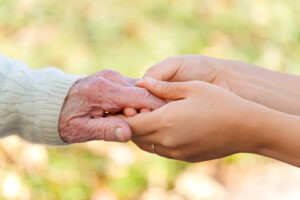Top Tips for Protecting Skin
As your elderly loved one ages, her skin has been changing. It is now easier for it to bruise, to dry out, and to sustain an injury. Skin injuries can lead to pain as well as other complications such as infection. It’s more important than ever to help your loved one protect her skin. Some steps of skin protection seem obvious to many – like applying sunscreen. A home care assistance provider will help ensure your loved one’s skin is protected all day long by implementing some changes around the home and helping with chores that may cause more damage to the skin.

Home Care Assistance Glen Rock NJ – Top Tips for Protecting Skin
A natural consequence of aging is a change in the skin – not only the top layer that you see but what is occurring underneath. The skin loses fat and becomes thinner, making it easier to see the veins below and causing wrinkles or folds. It also becomes dry and age spots appear due to decades of sun exposure. Your loved one might find injuries like cuts and bruises take longer to heal.
Five Top Tips for Protecting Elderly Skin
Using sunscreen. As mentioned, sunscreen will always be at the top of the list for any age when going outside. Your loved one needs to have sunscreen applied before she leaves the home (don’t wait until she gets to the park or beach) and then have it reapplied at least every two hours when out and about. If she’s in water, it should be reapplied every time she gets out of the water. A home care companion can help ensure she gets sunscreen evenly applied on all those hard-to-reach areas like the backs of her knees or shoulders.
Regular moisturizing. Elderly skin needs more moisture added to help it stay hydrated. After each hand washing and every bath, your loved one should apply lotion. Like sunscreen, it can help to have a home care assistance provider help with getting lotion on those hard-to-reach areas.
Wearing gloves. There are two key times to wear gloves to protect the skin. Wearing gloves or mittens in cold weather helps protect the skin from becoming chapped and irritated by cold air and wind. It can also help protect the skin from frostbite or other damage due to low temperatures. Wearing gloves while cleaning around the home is also an important way to protect the skin. Gloves will keep harsh chemicals from irritating and damaging the skin.
Go fragrance-free. The chemicals to add scents to lotion, soap, and even detergent can irritate the skin. If your loved one struggles with itchy skin, it might be the fragrances in her products. Look for fragrance-free instead of unscented. Unscented products often contain a chemical that covers up the scent.
Keep the air moisturized. While generally not an issue in the summer, winter months with forced heat can dry out the air so much it damages the skin and causes pain and itchiness. Have humidifiers around the home to help put moisture back into the air and your loved one’s skin when winter arrives. Add them to rooms where your loved one spends a lot of time such as bedrooms and living areas.
Regular skin examinations. Finally, don’t forget to perform regular skin examinations to look for signs of skin cancer. Finding it early can make it much easier to treat and protect the other skin around it.
If you or a senior family member are considering hiring Home Care Assistance Services in Glen Rock NJ, please get in touch with the caring staff at Caring Solutions Home Care LLC. In-home senior care servicing Bergen & Passaic Counties. Call today at (973) 427-3553.
- Understanding the Link Between Diabetes and Heart Disease - April 22, 2025
- Helping Seniors Overcome Nighttime Safety Fears - April 7, 2025
- Planning a Beach Trip With Your Elderly Loved One - March 24, 2025

